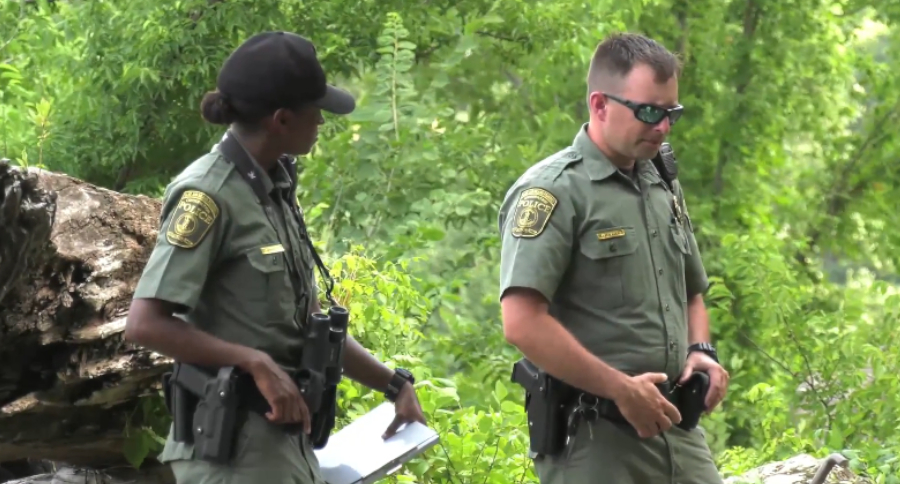Here is how you can break into a wildlife agency job.
Tired of your old job and looking for a change of career? Sick of the office or factory floor and want to get out into the outdoors every day, protecting private lands from trespassers and endangered species from poachers?
Sounds like a job with a wildlife agency may be for you.
But how do you even get started with acquiring a job in wildlife law enforcement as a game warden or a related field? Well, it isn't easy. But, it does make for an interesting career, as many poaching stories illustrate!
We thought we'd provide a primer on what you need to know about wildlife agency employment opportunities at both the state and federal level.
Basic Minimum Requirements
It really is difficult to break down all the different requirements for jobs working with wildlife agencies in the United States. Obviously, jobs like a wildlife biologist at a fish hatchery or something in wildlife management where you count, tag, or study animals in a wildlife management area are likely going to require a lot more advanced education than, say, a game warden job with your state Department of Natural Resources.
We're guessing most of you reading this article are interested in job opportunities that involve protecting wildlife resources, so we'll focus mostly on that.
Whether you are working at the state level as a DNR officer or at a federal level as a member of the U.S. Fish and Wildlife Service, there are some requirements that may take a lot of work to achieve.
The basic requirements are pretty simple for both state and federal game warden jobs. You must be a U.S. citizen, you must have a high school diploma, and a valid driver's license. Of course, potential game wardens must not have any felony convictions. The reason for this is obvious; if you have a felony, you can't own or carry a firearm.
If you're a reformed poacher looking to mend his or her ways, keep in mind most agencies want a squeaky-clean record. Many misdemeanors like fraud or assault will automatically disqualify you if you were ever convicted of one. DUIs and other major traffic violations can also be a factor unless you've kept your nose clean for years.
Also, be aware that pretty much every agency is going to do a background check, so there's no use trying to hide it. If your record isn't clean, they're going to know about it, and it may affect your eligibility for the job.
Also, most state agencies and the U.S. Fish and Wildlife service require potential candidates to be at least 21 years of age and no older than 36 at the time they apply. If you're in or about to graduate high school, you might look at obtaining a degree in a related field first. That dovetails into the next part of our discussion.
Education Requirements
Having at least a high school diploma is a given for any game warden job. Beyond that, the education requirements vary wildly from state to state.
Texas, for instance, requires a bachelor's degree. Otherwise, you're often looking at either an associate's degree or at a bare minimum, 60 credit hours of study in related fields like wildlife management or criminal justice studies.
Some states require a minimum number of years of education. California requires two years of study in law enforcement, police science, or wildlife management studies.
Some states like Vermont have lower requirements. Vermont requires just 20 credit hours of experience and a high school diploma. But this state also allows you to substitute a year of law enforcement, military service, or two years of full-time work in lieu of the college credits requirement.
For people who don't have the time to attend regular college classes, there are online options for bachelor's degrees in law enforcement or criminal justice studies.
If you're still in high school, there is some good news. More and more high schools throughout the country are offering college courses to high school students. Through work in my other job reporting on educational issues, I've met many high school students who had already earned or were working towards earning an associate's degree before their high school graduation.
These types of opportunities are popping up more and more often at high schools across the country, so ask your counselor about them. A little bit of hard work in high school won't just look good on the resume, it should give you a leg up on other potential wildlife agency candidates you might be competing against. Keep in mind that competition for warden positions is often quite fierce.
If you're under the minimum age requirements to enter a program for training, you can still make yourself more attractive to agencies by doing internships in related fields.
Also, and we know this is unlikely, but if you're an aspiring warden who is unfamiliar with hunting and fishing, take a hunter education course to get a better idea of the basics.
Training and Fitness
The physical requirements for many Fish & Wildlife jobs are more difficult than many people realize. In fact, many officers say it's harder than becoming a Sheriff's deputy or police officer. Just watch the above video from the Texas Game Wardens if you don't believe me. Most states have a mandated training program that can range anywhere from a few weeks to a full year.
Often, potential wardens are required to live on the grounds where the training is completed. Using Vermont as an example again, candidates must also pay a small fee to take a psychological assessment test and a Police Academy entrance exam.
Because wildlife officers are usually fully certified as police officers and take on many of the same roles, it may be easier to become a police officer and build experience for a few years before applying for a warden program.
In fact, some states mandate a year or more of law enforcement officer experience. Military experience helps, but depending on the state, there's no guarantee that will count towards a state's training requirements. The U.S. Fish and Wildlife service requires at least a year of experience in law enforcement or a four-year degree.
When it comes to getting to the federal level, it seems most officers start off in a state level natural resources job and build their reputation for years before making the jump. Even then, there's a 17-week training course for the Fish and Wildlife Service. If that's your goal, strap in, it's going to be a lot of work.
No matter what sort of job you're trying to get, all wildlife agencies require their agents to be physically fit. If you're carrying around a few extra pounds, you might want to hit the gym and work on burning them off before applying.
Be prepared for a lot of physical fitness, visual, and hearing evaluations. Potential wardens should also be aware many agencies will probably do drug tests and mental health evaluations as well.
Many states, including my home state of Michigan, post their physical fitness requirements online. Do a little research on where you hope to work, and you can know what is expected of you before you go. Just like any job, the better prepared you are, the more likely you are to make a good impression.
Oh, and if you don't already know how to swim, make sure you learn! It's pretty much guaranteed they'll send you home if you don't know how.
Often, even if you get through all the training requirements, most agencies will put new officers in an on-the-job training program with another experienced officer or into a probationary period before they are assigned to a job elsewhere.
How much do conservation officers make?
Again, this answer varies from state to state and agency to agency. Most jobs start out in the $35,000-40,000 range. Usually, the pay increases based on experience and top out anywhere from $60-80,000, so it's a job that rewards loyalty and hard work.
Going back to education for a minute, some states like Texas offer additional monthly stipends for additional educations or certification levels. Wardens in Texas can earn an additional $50 a month just for knowing a second language.
Also, be prepared for a lot of competition for very few job openings. As tough as the job is, there are many men and women who love the outdoors just as much as you do and want to protect our natural resources just as much. But with a little hard work and determination, you too can land your dream job!
For more outdoor content from Travis Smola, be sure to follow him on Twitter and check out his Geocaching and Outdoors with Travis Youtube channels.
NEXT: 8 MORE OF THE MOST INCREDIBLY STUPID POACHERS EVER
WATCH: HIGHLIGHTS FROM OUR WEST TEXAS TURKEY HUNT




